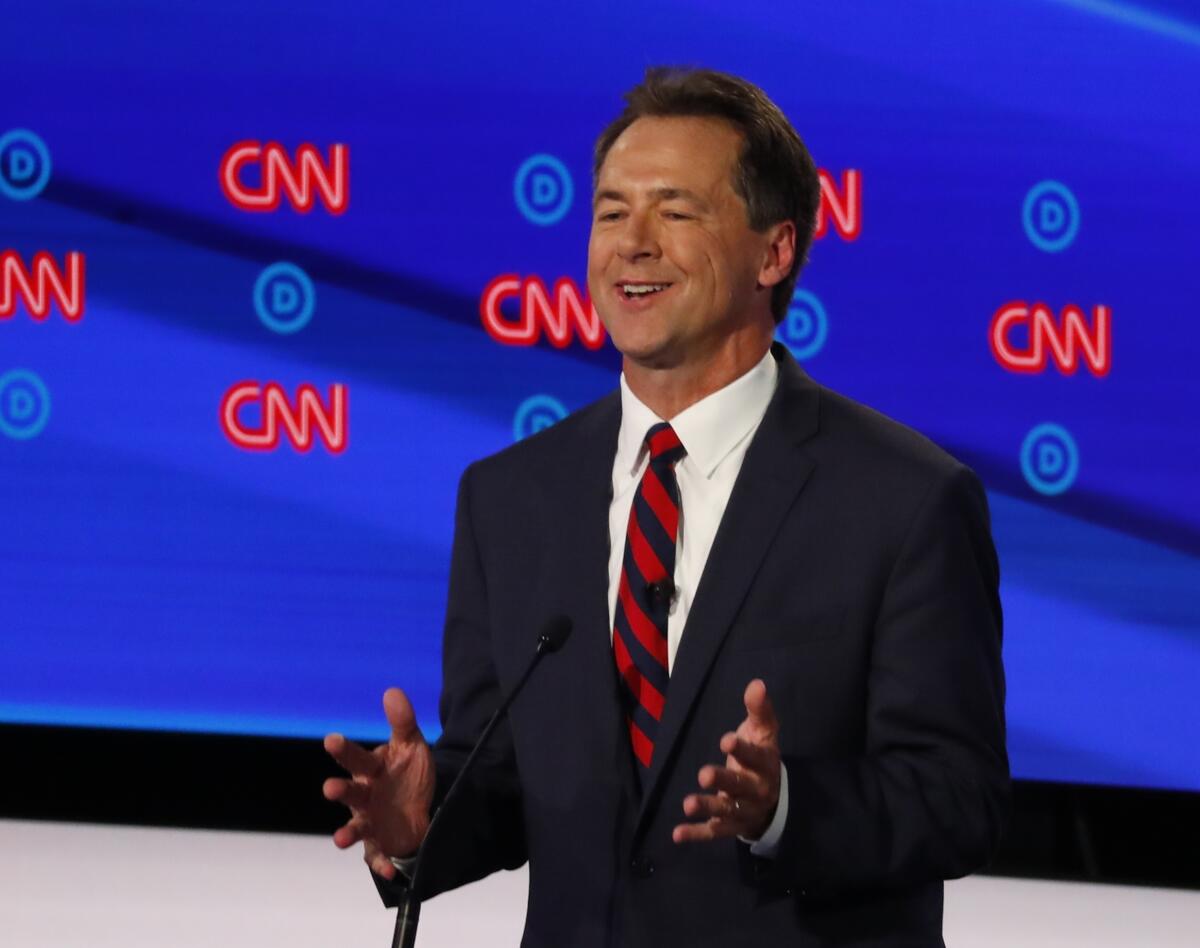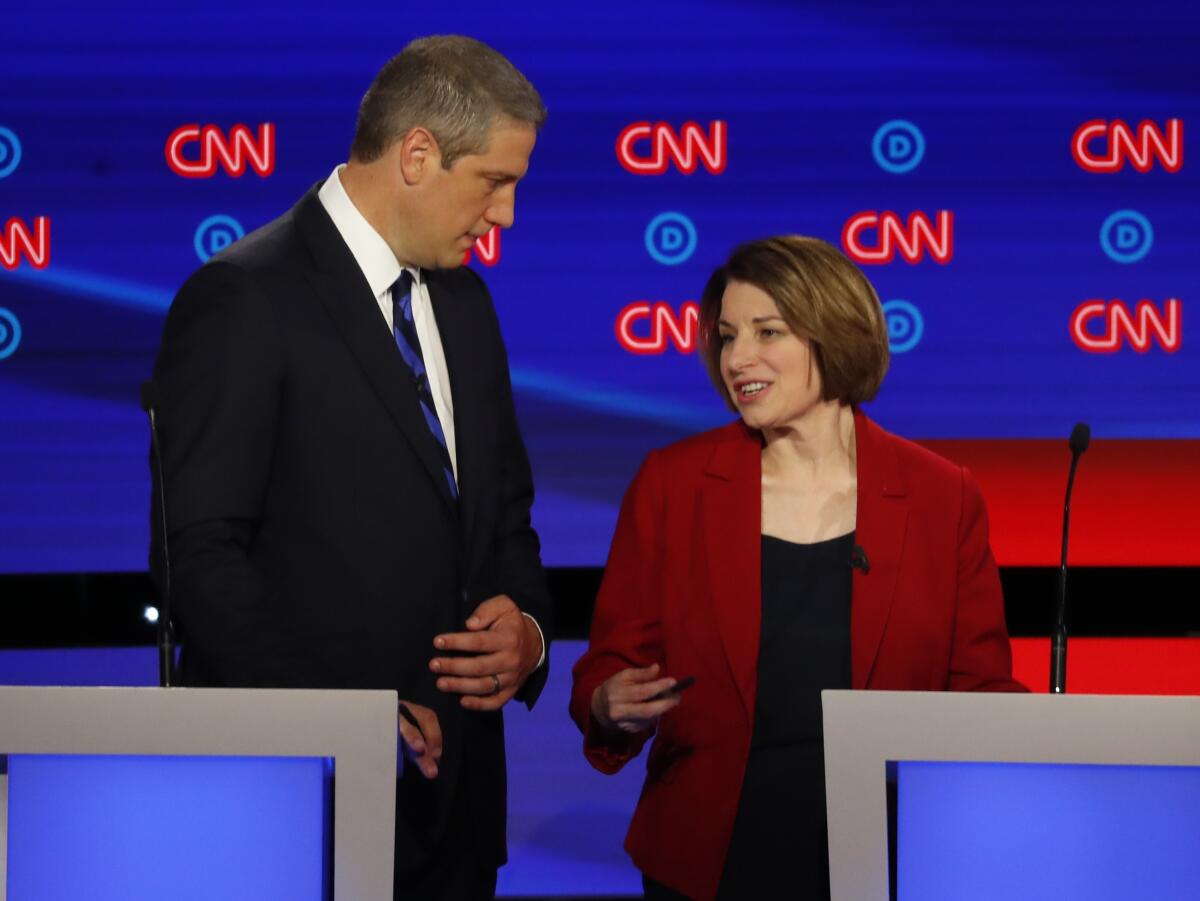At debate, Warren and Sanders spar with centrists over how to beat Trump
DETROIT — Democrats showed sharp differences over single-payer healthcare, immigration and climate policy Tuesday as a group of lesser-known candidates tried to use the second presidential primary debate to attack progressive standard-bearers Sens. Bernie Sanders and Elizabeth Warren.
The debate highlighted the fundamental changes advocated by Sanders, a Vermont independent, and Warren, a Massachusetts Democrat, who argue that defeating President Trump will require far-reaching plans.
“I don’t understand why anybody goes to all the trouble of running for president of the United States to talk about what we really can’t do and shouldn’t fight for,” Warren said after several candidates argued that she and Sanders would doom the party.
Several of their opponents argued that there was too much at stake to risk giving any advantage to Trump and that a more pragmatic approach would sway a wider swath.
“We are more worried about winning an argument than winning an election,” said Minnesota Sen. Amy Klobuchar.
Pete Buttigieg, the mayor of South Bend, Ind., tried to split the difference.
“It is time to stop worrying about what the Republicans will say,” he said. “It’s true, if we embrace a far-left agenda, they’re going to say we’re a bunch of crazy socialists. If we embrace a conservative agenda, you know what they’re going to do? They’re going to say we’re a bunch of crazy socialists. So let’s just stand up for the right policy.”
In the Democratic debate in Detroit, progressive candidates Elizabeth Warren and Bernie Sanders fend off attacks from centrists.
Tuesday’s debate — in front of about 3,000 people at the ornate and historic Fox Theatre in Detroit’s redeveloped downtown — marked the second gathering of the 2020 Democratic field, which is so large that even dividing the top 20 candidates over two nights has meant shutting some out. Though the election is more than a year away, the struggle for fundraising dollars and demonstrable voter support has made the debates crucial to candidates’ ability to sell themselves as legitimate contenders and, in many cases, to survive.
The debate, which clocked in at more than 2 1/2 hours, featured several feisty exchanges but remained civil, as the candidates spent much of the second half attacking Trump as a divisive president and existential threat to the country.
The two populist progressive senators, Warren and Sanders, drew the most attention. Sanders, who describes himself as a democratic socialist, has been in second place in many polls, behind former Vice President Joe Biden, through much of the campaign. But Warren has leaped ahead of Sanders in some surveys and gained significant ground on Biden, becoming a serious threat to overtake the Vermont senator as the progressive favorite and challenge for the nomination.
The two avoided sparring with each other, spending most of their time agreeing as they fended off attacks from the others and tried to show their appeal to the party’s activist base.
Biden and Sen. Kamala Harris of California — who have been tangling since the first debate in Miami in June — will lead the field of 10 candidates scheduled to take the stage Wednesday.
The Democratic divide over how to make healthcare more affordable and available to all was on full display from the first minutes of Tuesday’s debate, as centrist candidates took aim at the “Medicare for all” plans championed by Sanders and Warren.
Detroit hosts the July Democratic debate. Some candidates have campaigned in nearby Flint, but the city’s struggles and water crisis haven’t been a focus.
The clash reflected the deepening division in the field over healthcare, which was a point of attack for candidates leading up to the debate.
Moderates in the race see health policy as one of their clearest points of distinction. They caution that Medicare for all would threaten Obamacare and leave Americans with less coverage.

“This is an example of wish-list economics,” said Montana Gov. Steve Bullock. “It used to be that just Republicans wanted to repeal and replace. Now Democrats do as well.”
Sanders and Warren refused to yield in their push for a single-payer system, which they said is the only option for freeing American health coverage from the shackles of corporate corruption.
“Stop using Republican talking points,” Warren charged. “These insurance companies do not have a God-given right to make $23 billion in profits and suck it out of our healthcare system.”
The back-and-forth grew testy, as candidates arguing that those who chafe at Medicare for all lack backbone and vision clashed with the many on the stage sharing the outlook of Biden, arguing that the crusade for government-run healthcare reflects a Democratic Party in danger of drifting far to the left of the American public.
The moderates are pushing for a so-called public option, that would allow Americans who don’t like their commercial health plan to buy into a government plan.

Without naming Sanders, Klobuchar took issue with his campaign’s suggestion that the public-option approach is immoral.
“Clearly this is the easiest way to move forward quickly,” she said. “And I want to get things done,”
Former Colorado Gov. John Hickenlooper concurred. “It comes down to that question of America being used to having choices, the right to make a decision,” he said. “Evolution. Not a revolution.”
After CNN moderator Jake Tapper asked candidates to reveal whether they supported raising taxes to pay for a Medicare for all system, Sanders accused him of parroting the GOP. Sanders and Warren contended that the only Americans who would ultimately pay more under the system they envision are the wealthy and corporations, as everyone’s else costs would be offset by vanishing healthcare bills.
A poll released Tuesday by the Kaiser Family Foundation found majority support for expanding the government’s role in healthcare, with higher majorities supporting plans that keep private insurance as an option.
The candidates split along similar lines over whether to decriminalize border crossings by migrants who lack permission to enter the United States.
Warren said the law that makes some border crossings a crime, rather than a civil violation, has enabled Trump to have migrant children separated from their parents. Sanders joined Warren, and denied that his proposed surge in federal spending on healthcare and higher education would encourage illegal immigration.
A few others — Hickenlooper, Ohio Rep. Tim Ryan and former Texas Rep. Beto O’Rourke — rejected the idea of decriminalizing border crossings.
“I expect that people who come here follow our laws,” said O’Rourke.
The clash over how aggressive the party should be in embracing progressive policies emerged again when discussion turned to climate change.
The moderates took aim at the push for a Green New Deal, which many of the candidates have endorsed. The plan, drafted by progressives, has included calls for universal healthcare and guaranteed jobs, which the more centrist candidates warned threatened to get in the way of climate action.
“That is a disaster at the ballot box,” Hickenlooper said, referring to the combination of the Green New Deal and health plans that would abolish private insurance. “You might as well FedEx the election to Donald Trump.”
“It ties its progress to other things that are completely unrelated to climate,” said former Maryland Rep. John Delaney, who supports putting a price on carbon.
Warren again accused the more moderate candidates on the stage of embracing Republican talking points, misleading voters by latching onto peripheral elements of the Green New Deal and using it to attack a call to action on climate. She laid out her plan that builds on the Green New Deal by investing trillions of dollars in research and uses it to reorient the American economy toward green manufacturing.
Bullock warned that the tone of the party’s push on climate is alienating voters like those from his state, Montana, who have worked in coal and other fossil fuel industries much of their lives.
“There are folks who have spent their whole lives powering our country,” he said. “And far too often Democrats talk as if they are part of the problem.”
Sanders, who routinely rails against fossil fuel companies, took issue. “We are not anti-worker,” said Sanders, who emphasized that his plan includes a transition for coal workers and others in the industry to jobs in a more green-oriented economy.
“I get a little bit tired of Democrats afraid of big ideas,” Sanders said. “Republicans are not afraid of big ideas. They can give a trillion dollars in tax breaks to billionaires and profitable corporations. ... So please don’t tell me that we cannot take on the fossil fuel industry. And nothing happens unless we do that.”
The candidates reached unanimous agreement in decrying Trump’s racist statements and outlined how they would combat emboldened white supremacists as well as address the ongoing impacts of historical racist policies.
O’Rourke, who recently revealed that he and his wife are the descendants of slave owners, said he would sign into law a new Voting Rights Act as well as a House proposal to create a commission to study and develop a plan for reparations for the descendants of slaves.
Sanders, who opposes reparations payments, said he favors the plan of Rep. James E. Clyburn (D-S.C.) to invest 10% of appropriated funds to communities where 20% or more of the population has lived below poverty level for at least three decades.
Warren pointed to her education policy, including investing $50 billion in historically black colleges and universities.
Buttigieg, whose community has been roiled by a police shooting of a black man, said that although the racial divide remains an issue, he believes the work in the aftermath of the incident shows progress.
But he was also eager to call out Republican lawmakers, accusing them of enabling Trump with their failures to distance themselves from him as they did when David Duke, the prominent white supremacist, ran for office.
“When the sun sets on your career ... of all the good and bad things you did in your life, the thing you will be remembered for is whether in this moment, with this president, you found the courage to stand up to him,” he said.
The 10 candidates on stage for the first night of the two-night debate, selected by a draw for the CNN-hosted event, were all white. The candidates of color will take part in Wednesday night’s debate.
On Tuesday, the candidate who got some of the most applause in addressing racial inequality was Marianne Williamson, the author who is an asterisk in most public opinion polls.
“If you think any of this wonkiness is going to deal with this dark psychic force of the collectivized hatred that this president is bringing up in this country,” she said. “then I’m afraid that the Democrats are going to see some very dark days.”
Times staff writers Michael Finnegan and Matt Pearce in Los Angeles and Noam N. Levey in Washington contributed to this report.
More to Read
Get the L.A. Times Politics newsletter
Deeply reported insights into legislation, politics and policy from Sacramento, Washington and beyond. In your inbox three times per week.
You may occasionally receive promotional content from the Los Angeles Times.














